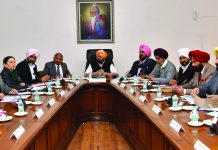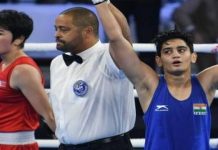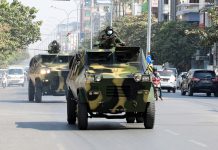
Addressing the gathering at Srinagar’s Grand Mosque after he was released from the jail, marking first concession by the government to separatist politics in Kashmir after the abrogation of Article 370, Mirwaiz reiterated Hurriyat stance on Kashmir in least controversial terms, writes Riyaz Wani
The release of the chairman of the moderate Hurriyat faction Mirwaiz Umar Farooq on the morning of September 22 and allowing him to address Friday sermon at Srinagar’s Grand Mosque marks a first concession to separatist politics in Kashmir since the withdrawal of Article 370 in August 2019.
Addressing a large congregation of worshippers, an emotional Mirwaiz reiterated Hurriyat stance in least controversial terms. He called Kashmir a long-standing issue which warranted a solution for regional peace, and especially for the well-being of Kashmiris.
“One part of Kashmir is with India and other two parts are with Pakistan and China and we believe that it will be complete after all the three parts are merged. We want a peaceful resolution,” Mirwaiz said. “We are not so-called separatists or peace disrupters but realist resolution-seekers,” he added.
His release was met both with a sense of relief and surprise. It was seen as a rare digression from the extreme hardline policy adopted by the central government in Kashmir. Mirwaiz had earlier filed a petition with the Jammu and Kashmir High Court challenging his “illegal” detention and seeking “to avail the freedom and liberty guaranteed to him under the Constitution”.
The court had on September 15 sought a reply from the J&K administration. Subsequently, the administration chose to free him.
Earlier on March 4, 2021 also, the administration had released Mirwaiz from house detention. At the time, the release was believed to have been the outcome of the then India, Pakistan ceasefire agreement signed two months earlier. Pakistan has long pressed for the release of the detained separatist leaders as one of the conditions for re-engagement between the two countries. And New Delhi probably chose Mirwaiz as he is considered dovish in his politics and subscribes to an idea of settlement of Kashmir on flexible terms, acceptable to India, Pakistan and Kashmiris. But two days later, the administration refused to allow him to address Friday sermon at the grand mosque, where the people were waiting for him. And when Mirwaiz didn’t turn up, they protested inside the mosque.
The scene, however, was not repeated this time. Mirwaiz arrived at the mosque to a warm and emotional welcome. Unlike in the past, the prayers by and large passed off peacefully. After namaz was over, a group of youth shouted pro-freedom slogans. They were subsequently arrested by police.
What does Mirwaiz’s release imply? What about the space for his separatist politics which is now strictly deemed anti-national? Will any space be afforded for his ideology? What will be the redline? These are the questions whose answers will become clear in the days and weeks ahead.
In the last four years, the administration has dealt with separatist groups and the leaders with a very heavy hand. All major separatist leaders such as JKLF chairman Yaseen Malik, Shabir Shah, Masarat Alam, Naeem Khan, Shahidul Islam and others are behind bars with little sign of their being let off any time soon. More so that of Yaseen Malik, who has been convicted and sentenced to life imprisonment. The death of Syed Ali Shah Geelani, the chairman of Hurriyat G faction, in September 2021 has left separatism without one of its most identifiable faces, who also commanded a wide support base.
The situation now has come to a point where the once-vaunted separatist conglomerate Hurriyat Conference has become extinct. Jailing of the grouping’s top leaders has hobbled its capacity to organize any political activity.
But even if the separatist leaders were free, the situation would hardly be different. The government has outlawed any sign of separatist activity in whatever form and disproportionately raised the costs for any leader or an activist to go out and champion the cause. So, it would be interesting to see how Mirwaiz would conduct himself in the drastically altered situation.













